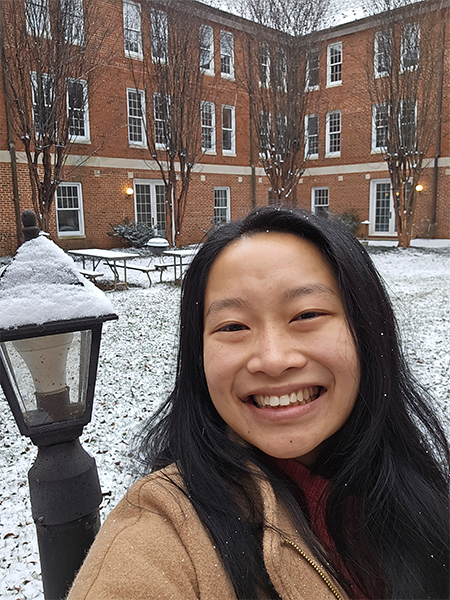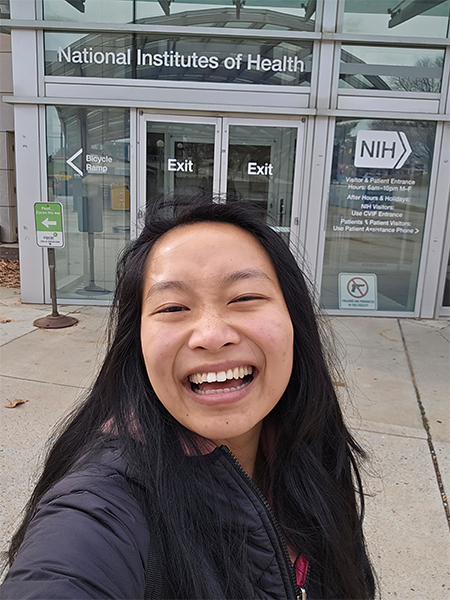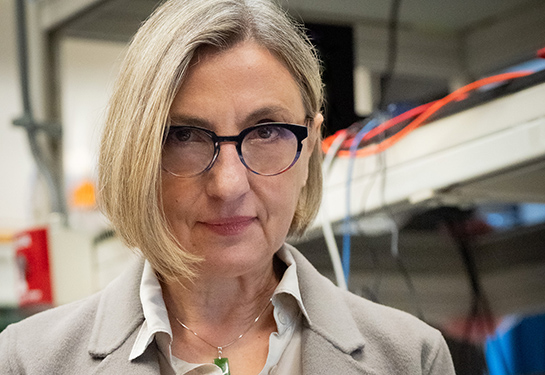Medical student joins prominent research program at National Institutes of Health
Jessica Tang is one of 52 scholars selected from across the country to participate in yearlong immersion experience
(SACRAMENTO) Jessica Tang is living a dream come true.

The UC Davis medical student eagerly packed her belongings last summer and moved to Bethesda, Maryland, where she is spending the academic year with a neurological research team at the National Institutes of Health (NIH). Tang is one of 52 future doctors from across the country accepted into the NIH’s competitive Medical Research Scholars Program.
“It’s phenomenal,” Tang said of her experience. “I get to meet some of the brightest people in their research fields — they amaze me.”
Some UC Davis students incorporate major research into their academic experience between their second and third years of medical school. But they typically stay in the Sacramento region. Tang, though, landed at the influential NIH Clinical Center. It’s known as the world’s largest hospital entirely devoted to clinical research.
She lives in residential housing on the NIH campus, a 5-minute walk (occasionally through the snow) to the research labs.
The program is a great fit for Tang, who had been wanting to conduct neurology research. She was inspired by her paternal grandmother and maternal grandfather who had dementia.
A passion for neurological research
After graduating from Manteca High School, Tang attended Yale University, where she helped faculty and fellows with their research on Alzheimer’s disease. She also conducted research on her own, which led to a co-first author publication before graduating in 2020 with a degree in neuroscience. She remained at Yale for another year of research under Stephen Strittmatter, a renowned expert in neurology and neuroscience, while also applying to medical schools.
“I really love research,” Tang said, “but I also love the patient side of medicine.”
When Tang entered UC Davis School of Medicine in 2021, she connected with a husband-and-wife research team at the UC Davis MIND Institute, Randi and Paul Hagerman. Both are leading experts in fragile X syndrome, a genetic condition. She helped the Hagermans conduct research, and they encouraged her to look into NIH programs for medical students.
Paul Hagerman said he’s not surprised Tang was accepted into the program.
“She has an incredibly inquisitive mind, is very intelligent, and is interested in both basic molecular research and patient-related research,” said Hagerman, a distinguished professor in the UC Davis Department of Biochemistry and Molecular Medicine.
“Her history and evident talents are truly exceptional,” he said. “She is precisely the type of medical student the NIH program is designed to support.”
Access to top-notch experts and mentors
When applicants enter the NIH program they choose a field of study — neurology, in Tang’s case. Then they get matched with a mentor. Tang has been assigned to Daniel Reich. His lab uses magnetic resonance imaging (MRI) to understand how multiple sclerosis (MS) injures the brain and spinal cord, how to stop that injury and how to promote repair.
Tang is also involved in another lab, with mentor Irene Cortese, who studies PML, short for progressive multifocal leukoencephalopathy. It’s a rare and devastating infection of the central nervous system caused by a virus, and so far lacks effective treatment.

Tang’s own research at the NIH involves tracking immune cells in MS and PML.
She also has been learning about regulatory aspects of clinical trials and analyzes MRI and positron emission tomography (PET) scans. She and the dozens of scholars attend workshops, journal clubs, clinical teaching rounds and lectures by top experts in their field. One of her highlights was meeting former NIH Director Francis Collins.
Tang gets to work in the labs and interact with patients going through clinical trials.
“This is what I always imagined ‘bench to bedside’ to be,” Tang said from her residential housing in a Zoom interview. “Being able to see the patients, understand the patient population, then meeting the patients, developing questions and doing the analysis and research.”
The NIH program plays a critical role in increasing the talent and diversity of the biomedical research community in the nation, according to Thomas R. Burklow, the NIH Clinical Center’s director for education and training, and also a pediatric cardiologist. “Our scholars enter clinical training inspired to seek careers as clinician-scientists, to turn discovery into health,” he said in a news release.
Scholars receive a stipend from the NIH to help cover expenses for the year, including housing.
Lifelong learning experience
Tang, who was born in China, immigrated to San Francisco as a toddler and grew up in Manteca, in what she describes as a low-income household.
She first became curious about medicine as a teenager during a summer program offered by the San Joaquin Medical Society called Decision Medicine. The two-week program takes high school juniors and seniors on tours of various hospitals in hopes they will become interested in being physicians and help fill the doctor shortages in places such as Stockton, Manteca and surrounding communities.
One of those tours was of UC Davis Medical Center. Tang recalled being impressed by the custom-designed prosthetics for children at the hospital. “That really piqued my interest in medicine,” she said.
Tang’s stint at the NIH will end in June. Then she’ll return to Sacramento to complete her final two years of medical school.
“I don’t want this year to end,” she said. “I want to go back to UC Davis, but this has been such a great experience. It’s cool, learning all this research.”



